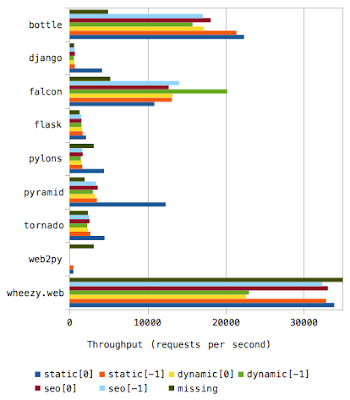How fast python web framework process routing (some calls this URL dispatch)? A typical web application usually has the following routes:
- Static: the URL path is fixed and never changes, e.g. https://bitbucket.org/explore.
- Dynamic: the URL path is constructed dynamically and can include semantic information, e.g. https://bitbucket.org/jsmith/dotfiles/downloads, in this case jsmith is user, dotfiles a name of source repository, downloads - feature.
- SEO: localization and internationalization is sort of must have for modern web applications, can combine two above.
- Missing: that always happen, url changed and resource is not available anymore. What is impact of handing a non-existing path?
We will examine all mentioned routes above with... a trivial 'Hello World!' application. Routing is written for various Python web frameworks, each entry in route table points to a simple `Hello World` handler. Test is executed in isolated environment using CPython 2.7. Latest available versions (November 17, 2013):
- bottle 0.11.6
- django 1.6
- falcon 0.1.7
- flask 0.10.1
- pylons 1.0.1
- pyramid 1.5a2
- tornado 3.1.1
- web2py 2.2.1
- wheezy.web 0.1.373
Let setup few prerequisites to be able run this in clean debian testing installation.
apt-get install make python-dev python-virtualenv \
mercurial unzip
The
source code is hosted on bitbucket, let clone it into some directory and setup virtual environment (this will download all necessary package dependencies per framework listed above).
hg clone https://bitbucket.org/akorn/helloworld
cd helloworld/02-routing && make env
Once environment is ready we can run benchmarks:
env/bin/python benchmarks.py







